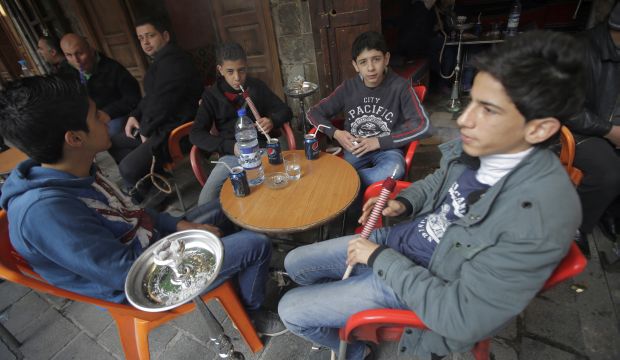
Syrian boys smoke water pipes at a cafe in the old part of the capital Damascus on January 16, 2014 as fighting continued in other parts of the country. (Joseph Eid/AFP/Getty Images)
Damascus, Asharq Al-Awsat—Rehab and Sally did not feel self-conscious on their first day at their new job in Al-Kamal coffeehouse in the Syrian capital Damascus. The coffeehouse regulars, however, were surprised to see the waitresses in a place usually only frequented by men. Although women have been working in Syria’s men-only traditional coffeehouses for years, this phenomenon has significantly increased since the Syrian war started. Ever since the escalation of the war and the worsening economic situation in Syria, many women in the country have had to take up previously male-dominated jobs in order to support their families.
“As the crisis in Syria enters its fourth year, Syrian people’s lives have changed significantly,” sighed Hamid, who Asharq Al-Awsat met in one of Damascus’s myriad coffeehouses. He glances over at one of the waitresses as she meanders among the customers serving drinks and pushing tips into her apron pocket.
The past three months in Syria have seen inflation and unemployment rates rise even higher. “As unemployment has soared, the search for livelihood has become pressing for everyone—for men and women,” Hamid said.
One coffeehouse owner said that more waitresses are being hired as they attract female customers who feel safer when served by someone of the same sex. It is also financially beneficial to employ women as they demand less pay—traditionally women have no responsibility to provide for their families. For example, a waitress will often only receive a monthly salary of 10,000 Syrian pounds (50 US dollars), while a man would accept no less than double this amount.
In another surprising trend, there has been a coffeehouse boom in central Damascus in spite of the unrest being witnessed in the rest of the country. Although many cafes in luxurious hotels and shops lost business and subsequently closed, there has been an increase in the number of traditional coffeehouses over the past three years.
Due to the collapse of the economy, various business owners in industries such as tourism have moved into the coffeehouse market. Umm Kalthoum coffeehouse in the heart of the Old City is one such new enterprise. Despite having only opened three months ago, business is already booming. Amid the noise of rolling dice and the television, the coffeehouse manager welcomes you with a broad smile. He says that he “wanted to remind people of the wonderful old days.” He says that they play Umm Kalthoum’s songs in the evenings, in reference to the famed Egyptian singer the cafe is named after.
Many of the names that have been chosen for the new cafes have cultural and historical significance. Coffeehouse names include Khaal (Uncle), a common title in Damascus given to the elderly as a sign of respect, and Shesh Besh, a phrase that is intimately linked to the coffeehouse in reference to backgammon and the numbers on the dice; Shesh is the number six in Persian and Besh five in Turkish.
Only a few months ago, Al-Bakawat coffeehouse was a large sportswear shop in Qanawat district in old Damascus. But why the name Al-Bakawat? The owner explains that Qanawat was once the domain of the upper class Bakawat minority (a title for noblemen) during the Mamluk period. However, as new upmarket districts emerged in Damascus such as Mezzeh, Maliki and Abu Rummaneh, the upper classes abandoned the Qanawat district for new areas. He added that the coffeehouse aims to remind customers of the past, even if in name only.
Al-Bakawat co-founder Fadhil Airan tells Asharq Al-Awsat that they decided to transform the sportswear center into a coffeehouse after sales declined dramatically. “My partners and I considered starting another commercial, profitable activity, and we eventually agreed on the coffeehouse idea, as there are so many cafe-goers, especially at this time of war and crisis.”
He explains that the business in central Damascus has thrived as residents of the suburbs travel to the center for their entertainment since their own local coffeehouses were destroyed in the fighting between rebels and the government. “Damascenes had to move to the coffeehouses in the lanes and markets within Damascus, something that lured many to change their businesses into coffeehouses.”
